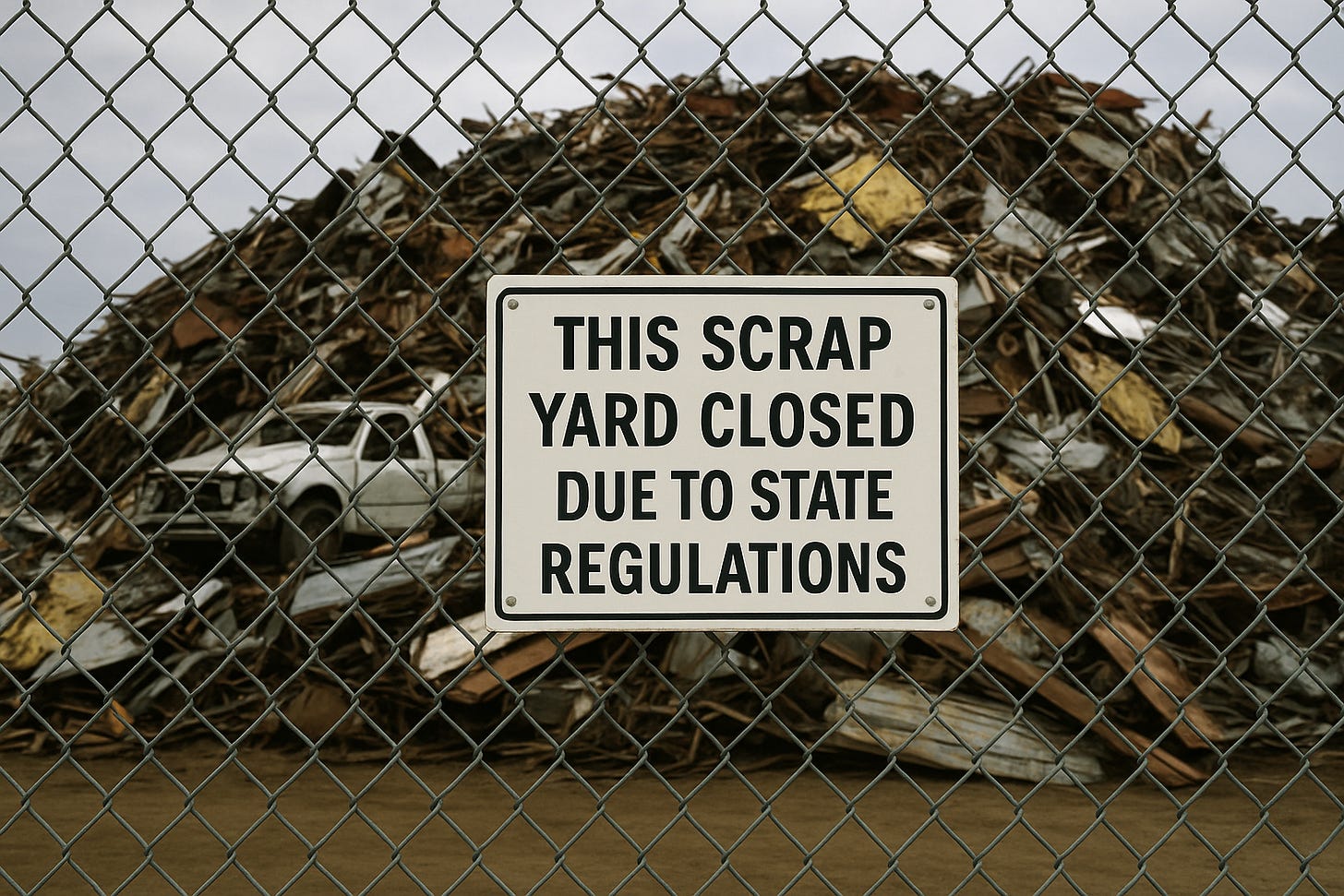California’s Capitol Rot: How SB 404 Embodies Sacramento’s Worst Instincts
When well-intentioned regulation threatens the livelihoods of California’s unsung environmental heroes
A Capitol Captive to One Party
For generations, Sacramento has been under near-unbroken Democratic control. This isn’t just a political quirk—it’s created a statehouse that’s grown comfortable with unchecked power. With little meaningful opposition, lawmakers churn out thousands of bills yearly, often without fully considering their real-world impact on working families and small businesses. The lack of competitive elections has fostered an environment where powerful interests—unions, corporations, and bureaucrats—hold outsized influence. Senate Bill 404, though not making headlines, perfectly illustrates this problem: a well-intentioned but flawed bill with serious unintended consequences.
SB 404: Good Intentions, Harsh Reality
SB 404 targets scrap metal recyclers—an industry built on hardworking families running small shops and independent “jobbers” who make ends meet collecting and sorting metals. Robert Hall, who owns Pacific Auto Recycling Center in Lancaster, already displays 18 permits and licenses in his conference room to keep his doors open. Now the bill would hand the Department of Toxic Substances Control (DTSC) new authority to require additional permits and potentially shut businesses down in 10 days.
Hall doesn’t use chemicals at his facility, which separates his small operation from the industrial giants. Yet SB 404 treats them precisely the same. “The idea that we’re not regulated is a pretty substantial stretch,” Hall told reporters, gesturing to his wall of existing permits.
When Big Business Benefits, Small Business Suffers
The uncomfortable truth is that large recycling corporations—many with deep pockets and foreign ownership—can absorb new regulatory costs that would crush smaller competitors. While no smoking gun proves deliberate market manipulation, the practical effect is apparent: expensive new requirements favor those who can afford compliance armies over family businesses scraping by.
The DTSC, tasked with regulating hazardous waste, is now expanding into an industry many of its targets don’t believe it fully understands. “Their area of jurisdiction is in waste,” Hall explained. “We’re providing a permit that moves their jurisdiction from waste to the process itself.” Mission creep could devastate small operators who’ve played by the rules for decades.
The Human Cost of Overregulation
Behind every small scrap recycler are real families with real bills. Maria Santos has been collecting aluminum cans and copper wire for seven years to help pay her rent. Joe Chen runs a small yard where neighbors bring old appliances—it’s not glamorous work, but it pays the mortgage and keeps his kids in college. These aren’t corporate executives; they’re working people who’ve found their niche in California’s informal economy.
Small scrap recyclers are also unsung environmental heroes. They keep bicycles, appliances, and construction scraps out of California’s strained landfills. When jobbers like Maria can’t make the longer drives to distant facilities—especially with gas prices climbing—more metal is buried instead of recycled. Hall warned that if small recyclers close, “material is going to get dumped in the desert; it’s going to get dumped in the national forest.”
A Symptom of Disconnected Governance
SB 404 isn’t California’s most pressing issue—housing costs, crime, and wildfires demand more attention. But it reveals how Sacramento operates: lawmakers with good intentions craft sweeping solutions without walking the floors of the businesses they’re regulating. Senator Anna Caballero, who introduced the bill, is described by Hall as “business-friendly” and “a good person.” The problem isn’t malice—it’s distance.
When legislators don’t see the faces behind the permits, when bureaucrats regulate industries they’ve never visited, and when compliance costs are abstractions rather than mortgage payments, well-meaning policy becomes a wrecking ball for working families.
Time for a Reality Check
California deserves environmental protection that doesn’t destroy the livelihoods of people doing ecological good. SB 404 needs major surgery: carve out small recyclers who, unlike industrial recyclers, do not handle toxic chemicals. Or better yet, ask whether we need another layer of regulation when existing oversight is already extensive.
More broadly, Sacramento needs a wake-up call. Before passing any new business regulation, lawmakers should spend a day with the people living under it. They should tour facilities, meet families, and understand the human cost of compliance. They should remember that behind every small business is someone trying to build something, often while serving their community and protecting the environment.
If we don’t demand this kind of accountability, the statehouse will continue to produce policies that help the powerful while hurting those just trying to make an honest living. The people of California—and their environment—deserve better.



